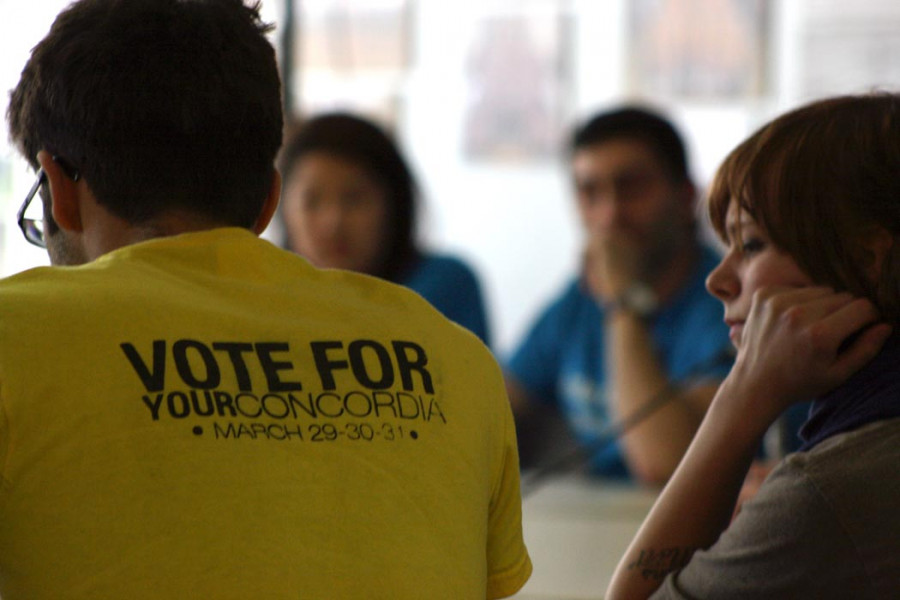A Union for the Union
Action and Your Concordia Vow to Work Together Towards a More Democratic Student Union
Though the 2011 Concordia Student Union election was among the most divisive and controversy-filled in the university’s history, on April 8, leaders from the Your Concordia and Action slates vowed to work together to reform a system both agreed is broken.
“The past few days, there’s been a lot of talk about how to move forward with the union,” said CSU president-elect Lex Gill. “Right now, we need a really united student body. This is really a historic moment. I don’t think that any point in the CSU’s history, two direct political opponents have come together this soon after the election and said, ‘Let’s work together.’”
This desire to work together resulted in a joint statement, signed by both Gill and Action presidential candidate Khalil Haddad, which states, “Neither team will file any contestations of the election against the other party. At this point, we believe that any contestations would cause further divisiveness without changing the outcome of the vote, and keep us from getting to the work of serving students and reforming the CSU.”
The statement pointed to specific areas of regulation and oversight that need reform, including “the CSU’s bylaws and standing regulations concerning the slate and affiliation system, arts and science representation, electoral expenses, and reporting and access to financial documents.”
Both Gill and Haddad singled out the slate system itself as a source for the divisiveness and negativity that has marked CSU elections, which this year included accusations of cheating and foul play on both sides.
Gill called the system “toxic,” and pointed to the 2009 election in particular, after which some candidates have said they felt uncomfortable coming to the Concordia campus.
“The slate system has to go,” she said. “It creates a winner-takes-all system, it pits people who would normally be working together against each other over normally small differences of opinion and tactics.”
“We want to promote a culture of respect,” added Haddad. “It’s a vicious cycle of opponents running and fighting all the time. Despite everything that happened in this election, [we want to] focus on what we want to bring to students, and promote good values. I think this can send a very strong statement.”
There is a precedent for a non-slate system in Concordia campus politics. The Arts and Science Federation of Associations switched to an individual-based model this year. The election was marked by a lack of candidates for some positions, with many vice-presidential spots going uncontested.
“The ASFA election, it was the first time it had ever been done,” said Gill. “It hadn’t been a very politically controversial year at ASFA, there was no major difference of opinion or catalyst of change that was necessary. Perhaps it wasn’t not competitive because of the new system, maybe it was not competitive because there wasn’t much to compete over.”
Haddad admitted that it was not an easy decision to not contest the results of the election. Though the vote was close, Your Concordia ended up winning the executive slate ballot by about 350 votes, and won all the councillorships, except for those that represent the John Molson School of Business, as well as one seat each for independent students and the Engineering and Computer Science faculty.
“We believe that any contestations would cause further divisiveness without changing the outcome of the vote, and keep us from getting to the work of serving students and reforming the CSU,” said the statement.
“It was a very difficult decision,” said Haddad. “The question is, do we want to look back at this moment and have no regrets? […] The reason I wanted to be part of the CSU is to make that change.”
Though the only Action slate members who will have a formal role on Council next year are those who will be sitting as representatives of JMSB, as well as the single councillors for independent students and Engineering and Computer Science, Gill expressed a desire to see all the members working together in the next year.
“I want to see all the members of Team Action play a really active role in campus life. A lot of them are very involved in their own groups or associations […] These are all people that are super engaged on campus. To bring these people together and have meaningful consultation and collaboration, these are the things we’re looking for.”
In terms of dialogue since the election, Gill and Haddad agreed that their conversations have been constructive, and hope to leave all acrimony in the past.
“We’ve talked quite a bit about the things that might have been contestations, [which are] being brought up instead in our report to council,” said Gill. Haddad added, “We don’t want anyone to experience it again.”


